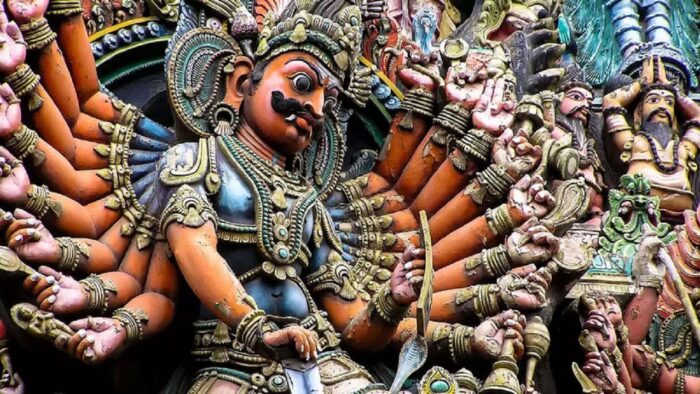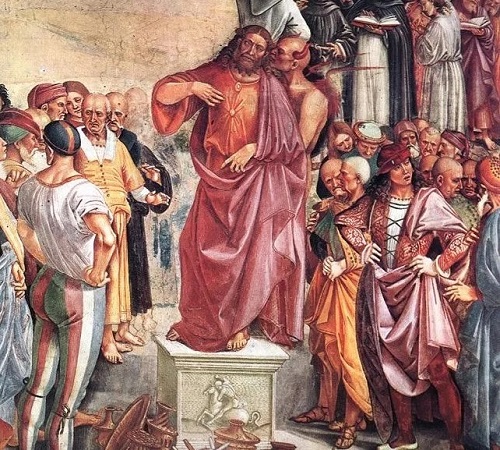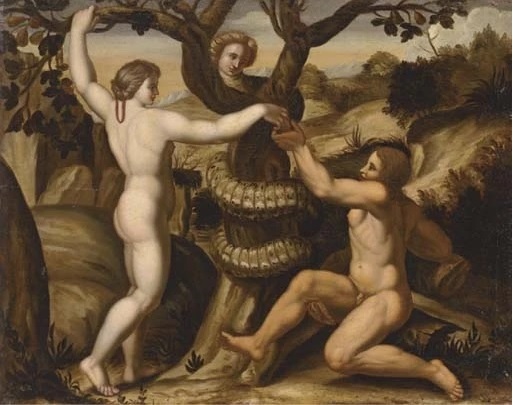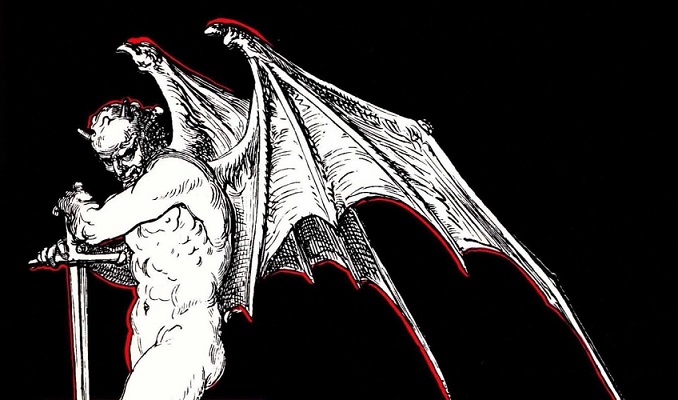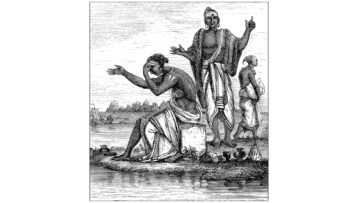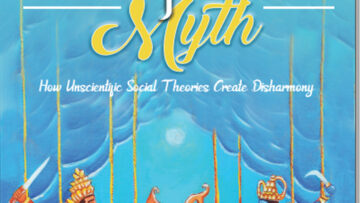INTRODUCTION
The festival of Deepavali reminds us of the extent to which the devatas continue to play an important role in our everyday lives even in modern day India. From puja in our homes, to temple rituals to festivals, the presence of the devatas are felt in almost every aspect of our lives. Festivals such as Deepavali and Dusshera allow people from different communities and different walks of life to come together, interact, celebrate, and most importantly, show reverence to our devas and devis. And of course, these devas and devis are the central figures in the puranas and itihasas around which most of our traditions and rituals are structured.
In most of these festivals and traditions, alongside the devatas, the asuras also play an equally important role. Without Ravana, there would be no Ramayana or Deepavali or Dussera. Without a Mahishasura, there would be no Durga Puja, the Devi Mahatmayam wouldn’t exist, and Durga wouldn’t be called MahishasuraMardhini.
Despite the fact that asuras play an important role in our traditions, there has been very little scholarly literature analyzing the role they play in our stories and traditions. Most of the popular as well as scholarly literature refers to them as demons. The English word ‘demon’ is used as a synonym for the Sanskrit word ‘asura’. Asuras are known as demons by the majority of the English speaking Indian public as well. We generally think of demons as bad or evil creatures. The devas are considered the good guys and the asuras, the bad guys. But are asuras demons? What makes any being into a demon? What is evil?
The first people to translate the word ‘asura’ as demons were the British/European missionaries and orientalists. It is important to keep in mind that the British were not neutral veridical observers of our Hindu traditions. They interpreted our culture and traditions through the lens of a pre-existing framework, namely Christian theology. Thus, ‘deva’ is translated as ‘God’ and ‘asura’ as ‘demon’. God and demon are part of a cluster of Christian theological terms, with each of those terms having a specific meaning within Christian theology, and are interconnected with other theological concepts in specific ways. Through the modern education system, Indians too started describing asuras in this manner.
The following article raises the question of whether or not it is appropriate to translate asuras as demons. In the process, I show that by translating asuras as demons we actually distort our understanding of asuras and the role they play within our stories.
This first part of this article discusses the role of Satan and his minions (the demons) within Christian theology, and concludes both Satan and demons are alien to the Hindu traditions. The second part of the article examines the kind of beings the asuras are within the puranas and the role they play within them. This is then compared and contrasted with the role of demons within Christianity. I would like to forewarn the readers that this article is by no means an exhaustive treatment of the topic of asuras. This is a huge topic covering complex concepts such as evil and dharma, each of which would take multiple books and articles to understand fully. Think of this short article as a beginning, a primer that introduces the topic of asuras and the issues that are at stake. Hopefully, this article will spur future articles that delve into this topic in greater detail.
GOD AND THE PROBLEM OF EVIL
‘’In the beginning God created the heaven and the earth. And the earth was without form, and void; and darkness was on the face of the deep. And the Spirit of God moved on the face of the waters. And God said, Let there be light: and there was light. And God saw the light, that it was good: and God divided the light from the darkness.’’ – Genesis 1:1-4
This is how the Old Testament of the Bible begins: the creation of the cosmos by the Biblical God. There are some features that stand out in this passage when comparing it to creation accounts within the Hindu texts. Firstly, the Hindu texts contain multiple accounts about the origin of the world. Some of them don’t involve a creator. Within the Hindu texts, there are even accounts that claim that the cosmos has no origin at all, and that it has always existed. Indians readily acknowledge that these are stories and speculations, and we aren’t particularly concerned about the true origin of the universe. In contrast, for the Christians and Jews, the creation account in the Old Testament is not a story but the true historical account of the cosmos. There is no room for multiple accounts. The Biblical God is the creator and sovereign of the cosmos and the cosmos has a beginning point, before which nothing existed except God. God is separate and distinct from the universe, and he created the universe out of nothing (ex nihilio). In fact, time itself didn’t exist before the creation of the universe. It was the Biblical God that created time. Whereas in the Indian traditions, the rise and dissolution of the universe is a constant recurring process. Even the creator Brahma goes through the cycle of birth and death. In addition creation is not ex nihilio in the Hindu texts. The universe and its denizens are always created out of something, whether it be the waters of KshiraSagara or out of clay and dirt. Finally, within the Indian traditions, the creation of and events that happen within the universe are spontaneous processes, not planned or designed[1].
According to Christianity, the universe is governed by God’s plan and purpose (his will). The Church father Augustine describes the cosmos as a book written by a perfect poet who has shaped the plot from its beginning to its end and has perfectly chosen every word, syllable, and letter. God is good and his creations are an expression of his goodness. In order to increase goodness in the world, he created human beings with free will. As agents with free will, we can deliberate and choose between alternative actions and decisions. The concept of free will becomes the basis of Christian morality. Without man’s freedom to make a choice between good and evil, morality is meaningless. In Christian theology, evil is anything that goes against the goodness of God and violates God’s will. When God created the world, he created an earthly paradise, and God’s paradise was perfect. Death and disease were absent. There was an abundance of food. No living creature killed another (for food or any other reason) and there was no aging. God then created the progenitors of humanity, Adam and Eve, and placed them in Eden. God instructed Adam and Eve that they may eat the fruit of any tree in the garden except the fruit of the tree of knowledge. However, both Adam and Eve disobeyed God and ate the fruit of the forbidden tree. This was the original sin committed by the first human beings, their disobedience of God. As a result of original sin, Adam and Eve were cast out of paradise, and paradise itself was eventually destroyed. Another important consequence of original sin was that all of humanity (being the descendants of Adam and Eve) became corrupted by original sin. We are born as sinners with a proclivity to sinful conduct. Sin is any action that goes against the doctrines and laws of God.
Evil, therefore, comes in two forms: natural evil and moral evil. Sin is moral evil. Natural evil refers to natural phenomenon that causes pain and suffering in the world such as tornadoes, earthquakes, droughts, diseases etc. These phenomena are considered evil because it goes against the original perfect state of nature, which was devoid of pain and suffering. Original sin not only caused the fall of man into corruption, but also caused nature to fall into an imperfect state. The early Jewish and Christian thinkers were preoccupied with the problem of evil: If God was perfectly good and trustworthy, and his works are perfectly good and trustworthy, how can there be so much evil in this world? One of the answers to this problem was the original sin of Adam and Eve that made us into beings with the proclivity to sin. However, for many of the Jewish and Christian theologians, original sin alone is not enough to explain the vast and terrifying quantity of evil in the world. Another answer was to posit as the source of evil a spiritual being opposed to the Lord God. Christian thinkers ascribed enormous power to this spiritual prince of evil. The idea of Satan began to emerge, a supernatural being whose nature is to obstruct.
DEMONS: SATAN AND HIS MINIONS
The first beings that God created are the angels, enormously powerful and intelligent creatures, to whom God gave free will. Directly after their creation, some of the angels used their free will to rebel against God on account of pride. This rebellious host was led by Satan who was an angel himself. Satan and his host of angels are then cast out of heaven forever and end up becoming demons.
(Figure 1: Fall of Satan From Heaven. Pic Credit: artwork by Jvdas Berra)
The word Satan is derived from Hebrew and means ‘adversary’. Another meaning of the word Satan means ‘one who obstructs’. These two meanings encapsulate the role of Satan within Judeo-Christian theology. Satan and his demons exist as enemies of God and his creation. They attempt to obstruct the kingdom of God from being established on earth and attempt to thwart God’s will by tempting human beings to sin and leading them astray from God. According to some interpretations of the Old Testament, it was Satan who tempted Adam and Eve to eat the fruit of the forbidden true and commit original sin.
(Figure 2: Satan and his minions. Pic Credit: art by Gustave Dore)
The primary way Satan leads humanity astray is by tempting human beings into committing idolatry. Christianity considers the worship of anything other than God as idolatry and the equivalent of worshipping the devil. Idolatry, in the eyes of many theologians, is the root of all sin. The purpose of human existence is to obey and worship the Biblical God only in the way he wants to be worshipped. It is the only way we as human beings can attain the kingdom of heaven. If we do anything else, we are sent to hell for eternity.
But how do we human beings know how he wants to be worshipped? This is where revelation comes in: He has revealed how he should be worshipped in the Bible, which Christians regard as the inerrant word of God, and contains his laws and commandments (that human beings are obligated to obey).
(Figure 3: The Devil Tempting The anti-Christ. Pic Credit: Luca Signorelli Year 1500-1504)
The kingdom of Satan has been waging a war against the kingdom of God since the beginning of humanity. When human beings became alienated from God due to original sin, they came under the thrall of Satan. Before the coming of Jesus Christ, humanity was steeped in idolatry. It is only by having faith in the Biblical God through his son Jesus Christ that these idolaters can be saved. This was the framework through which the Christian missionaries who initially travelled to India saw and described the Hindu traditions. Indians are idolaters and their devatas are false gods and minions of the devil. They need to be converted into Christianity in order to be saved from eternal damnation.
SATAN: THE PERSONIFICATION OF EVIL
Now that I have discussed the role of Satan and his demons within Judeo-Christian theology, I revisit the question of what makes Satan evil. Satan is not only the enemy of God and the kingdom of God, but the very antithesis of God. The Devil is a creature of God, a fallen angel, but as chief of fallen angels (demons) and of all evil powers, he acts as an opposite principle to God.
(Figure 4: Devil Tempting Adam And Eve To Eat From The Forbidden Tree. Pic Credit: Mutualart.com)
God is perfectly good and trustworthy, his word and works are perfectly good and trustworthy. Satan on the other hand is the prince of lies and deception. He corrupted the creation of God, both human beings and the natural world. The world of nature is created by the good Lord for good purposes but Satan and his demons have twisted and corrupted this world by causing death, disease, and natural disasters. Satan is also the lord of human society because of its tendency to sin. God offers salvation to all who have faith in him and his word (expressed through worship of God and obedience to his laws and doctrines). Whereas, Satan leads people astray by temptation and lies to worship him instead of God. God is love. Satan sows discord and hatred and schisms among Christians. Anyone who does not follow the Lord is under Satan’s power. As Satan was the opponent of the good Lord of the Jews, so he is now the opponent of Christ, the son of the good Lord.
(Figure 5: The Prince Of Darkness.Pic Credit: artwork by Jefferey Burton Russell,1992)
I would like to conclude this section and the first part of my essay by stating that both the Biblical God and Satan are alien to the Hindu traditions. Hindus do not experience the world as being governed by a grand plan or intelligent design. Neither do they believe in a sovereign ruler of the cosmos whom we are obligated to obey and not question. For example, in a story narrated in the Tamil epic Thiruvilayadal Puranam, Nakkeerar was a famous Tamil royal poet who lived two thousand years ago. He wrote several Tamil poems. His name was a household name because of his clash with Siva. He criticized the grammar and structure of a Tamil poem written by Siva himself. Siva disguised himself as a poet went to the royal assembly and challenged the royal poet Nakkeerar. Even when the old poet revealed his true identity as Siva, Nakkeerar was adamant and said, “I don’t care even if you open your third Eye. A flaw is a flaw”.
Even though the word shaithan has become part of the Hindi language, the majority of Indians do not know who he is or the role he plays in the Abrahamic religions. Most of the Indians I have spoken to regarding the meaning of the word shaithan, have a vague notion of a very cruel, fearsome, monstrous figure; similar to a bhooth. Others equate the term shaithan with asuras or rakshasas.
As I shall explain later on, the concept of sin and evil are also alien to the Hindu traditions. Paapa does not mean sin. Adharma does not mean evil. In the second part of this paper, I explore the nature of asuras within the puranas and compare and contrast them with the demons of the Abrahamic religions.
[1] This is beautifully expressed in the concept of Lila or play. Creation is spontaneous like a child playing
Feature Image Credit: indiatimes.com
Disclaimer: The opinions expressed in this article belong to the author. Indic Today is neither responsible nor liable for the accuracy, completeness, suitability, or validity of any information in the article.

